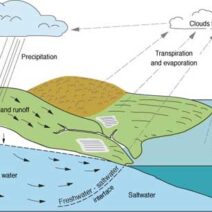South Africa stands on the precipice of a significant climate crisis, an ever-looming specter that has ignited alarm among environmentalists, policymakers, and citizens alike. The nation’s unparalleled biodiversity, economic aspirations, and socio-political fabric are intertwined with the increasing impacts of climate change. As warming temperatures exacerbate old challenges and unveil new ones, an urgent need for adaptation emerges, requiring a multifaceted approach. This discourse delves into the intricacies of South Africa’s climate challenge, revealing the underlying reasons for its complex relationship with global warming.
To comprehend the nuances of South Africa’s climate struggle, one must first consider its geographic diversity. This nation boasts arid deserts, lush forests, savannahs, and a remarkably varied coastline. Each of these ecosystems is vulnerable to climate change, manifesting in altered precipitation patterns, heightened temperatures, and increased frequency of extreme weather events. The South African Weather Service predicts that average temperatures may rise by 2 to 3 degrees Celsius by the year 2050, a grim prospect that threatens both terrestrial and aquatic life.
Moreover, South Africa’s economy, heavily reliant on natural resources such as mining and agriculture, faces an existential threat. The agricultural sector, vital for food security and employment, is particularly susceptible to erratic rainfall and drought conditions. Crop yields are anticipated to decline, especially for staple foods like maize and wheat, heightening the risk of food insecurity. The plight of farmers, especially smallholder farmers, who depend on predictable weather patterns for their livelihoods, cannot be understated. It presents a pressing challenge to economic sustainability and social equity.
Compounding these challenges is a legacy of socio-economic disparity. South Africa’s history of apartheid has resulted in profound inequalities, particularly in access to resources and climate resilience. Marginalized communities—often those most affected by environmental degradation—struggle to adapt to climate impacts due to limited financial capacity, insufficient infrastructure, and inadequate access to information. Therefore, the intersection of climate change and social justice creates a complex framework that necessitates an inclusive policy approach that addresses the needs of all citizens.
Climate adaptation strategies must be comprehensive and integrate various sectors and levels of governance. South Africa’s National Development Plan recognizes the importance of climate resilience but faces obstacles in implementation. Policy frameworks must transition from mere rhetoric to actionable strategies that empower local communities, promote sustainable practices, and bolster infrastructure resilience. Community-led initiatives can serve as exemplars in tackling local climate challenges, allowing for tailored solutions that resonate with the specific needs and capacities of differing populations.
Renewable energy presents an opportunity to revitalize South Africa’s economy while mitigating greenhouse gas emissions. The country possesses immense potential for solar and wind energy generation, both of which can substantially reduce dependence on fossil fuels, particularly coal, which currently dominates the energy landscape. Transitioning towards renewables can catalyze job creation and stimulate economic diversification, which is essential for long-term sustainability. Furthermore, such an energy transition can enhance the nation’s energy security, making it less vulnerable to volatile global energy markets.
Water scarcity is another pressing concern. With the potential for decreased rainfall and prolonged droughts, water stress will become more acute, affecting agriculture, drinking water supplies, and industrial processes. Innovative water management practices, including rainwater harvesting, wastewater recycling, and the development of drought-resistant crop varieties, are critical. Policymakers must collaborate with scientists and local communities to develop adaptable water governance strategies that prioritize both ecological health and human welfare.
Education and awareness also play pivotal roles in fostering climate resilience. A greater understanding of climate issues can galvanize communities, incentivizing them to take part in mitigation and adaptation efforts. Programs that educate the youth on sustainable practices and environmental stewardship are vital for cultivating a generation that is conscious of the impacts of climate change. Behavioral shifts among both individuals and industries can lead to substantial improvements in resource management and conservation efforts.
In urban settings, harnessing sustainable practices can significantly mitigate climate risks. South Africa’s cities are expanding rapidly, often without regard for environmental sustainability. Implementing green infrastructure—such as urban forests, permeable pavements, and green roofs—can enhance urban resilience against heatwaves and flooding, while also contributing to improved air quality. Sustainable transport systems, including public transit improvements and cycling infrastructure, can reduce emissions while promoting healthier lifestyles.
Moreover, South Africa’s rich biodiversity must be safeguarded amidst the climate crisis. Conservation strategies tailored to protect vulnerable ecosystems, such as fynbos and wetlands, will not only preserve invaluable natural heritage but also bolster ecosystem services essential for human survival. Nature-based solutions can provide a buffer against climate impacts, offering both adaptation and mitigation pathways.
As South Africa faces the dual adversities of climate change and socio-economic disparity, proactive engagement and unified action are imperative. The path forward lies in acknowledging the intricate relationships between environment, society, and economy. The nation’s response to climate change must not only focus on minimizing harm but also embrace the potential for innovation and resilience. By fostering collaborative strategies that are inclusive and sustainable, South Africa can emerge as a model for other nations grappling with similar climate challenges, ultimately leading to a more resilient planet.







